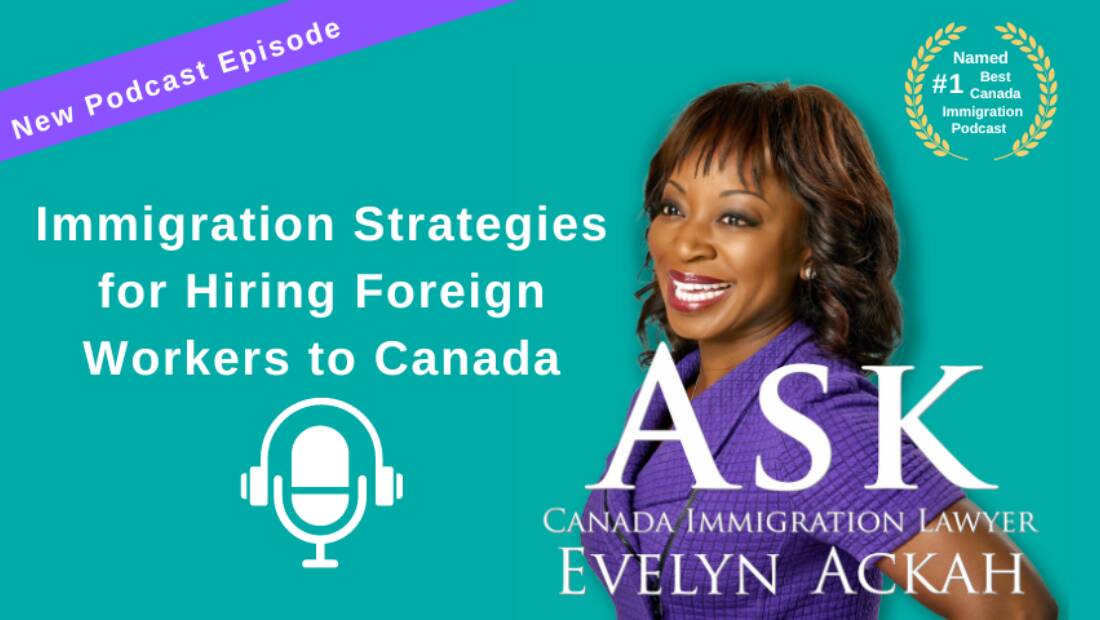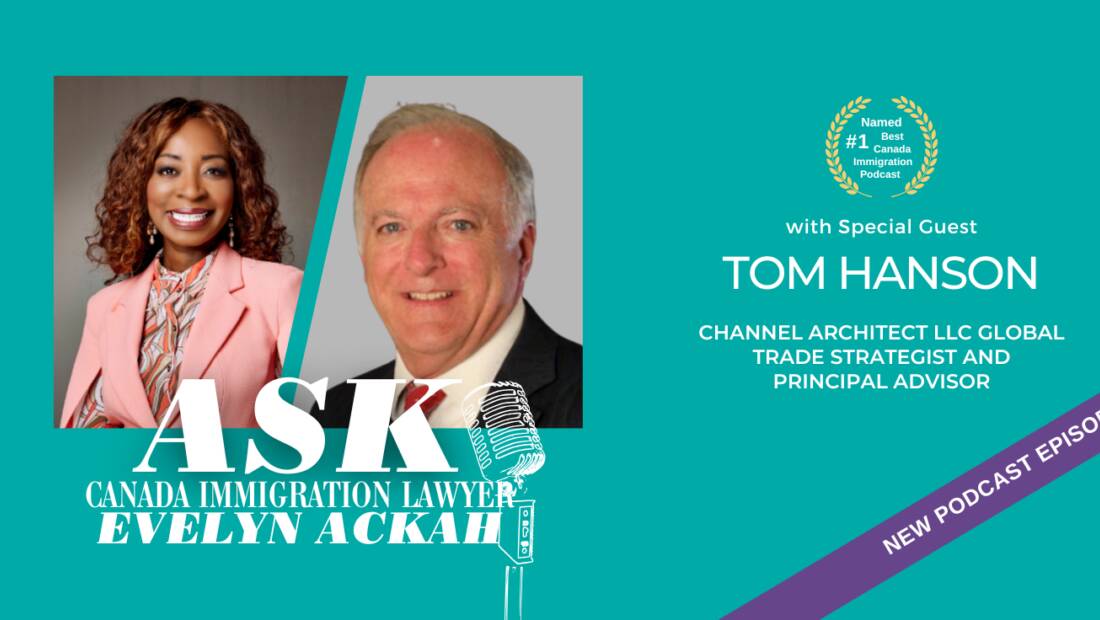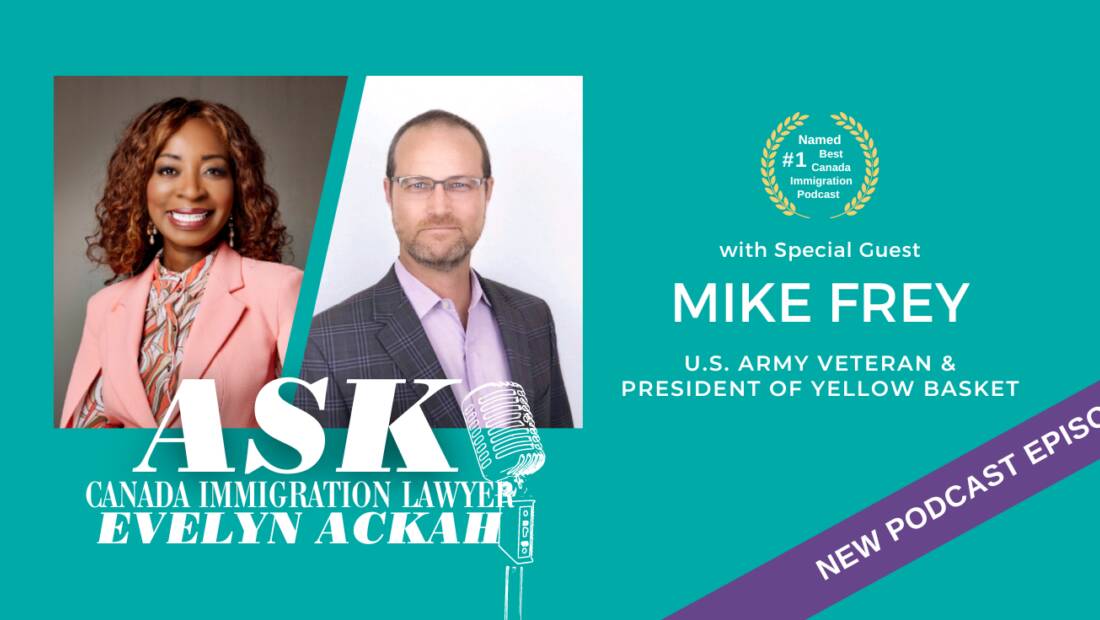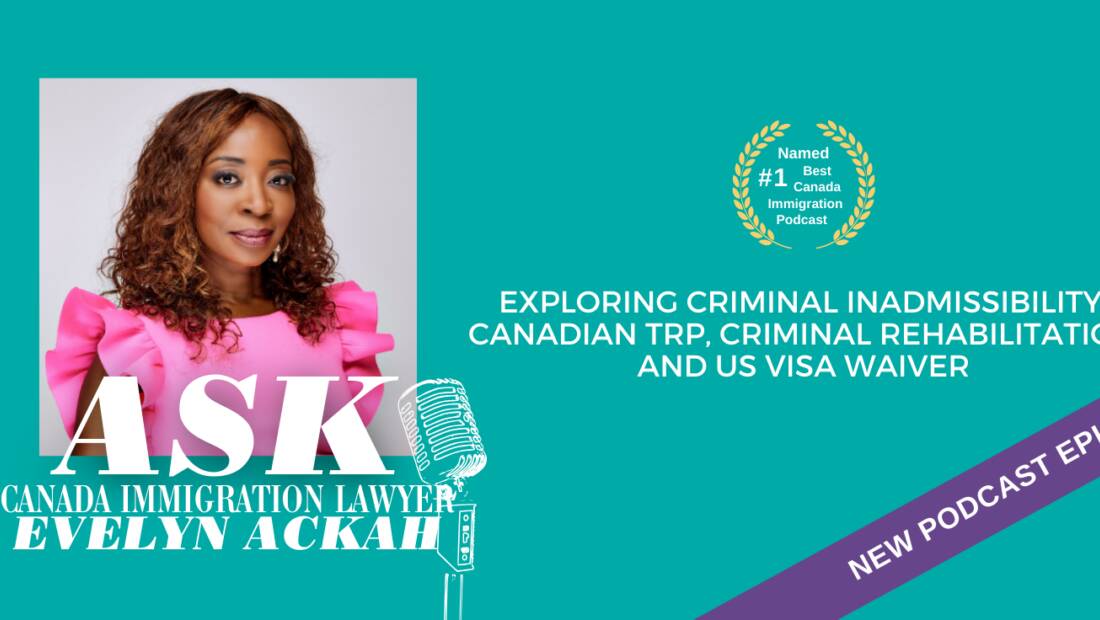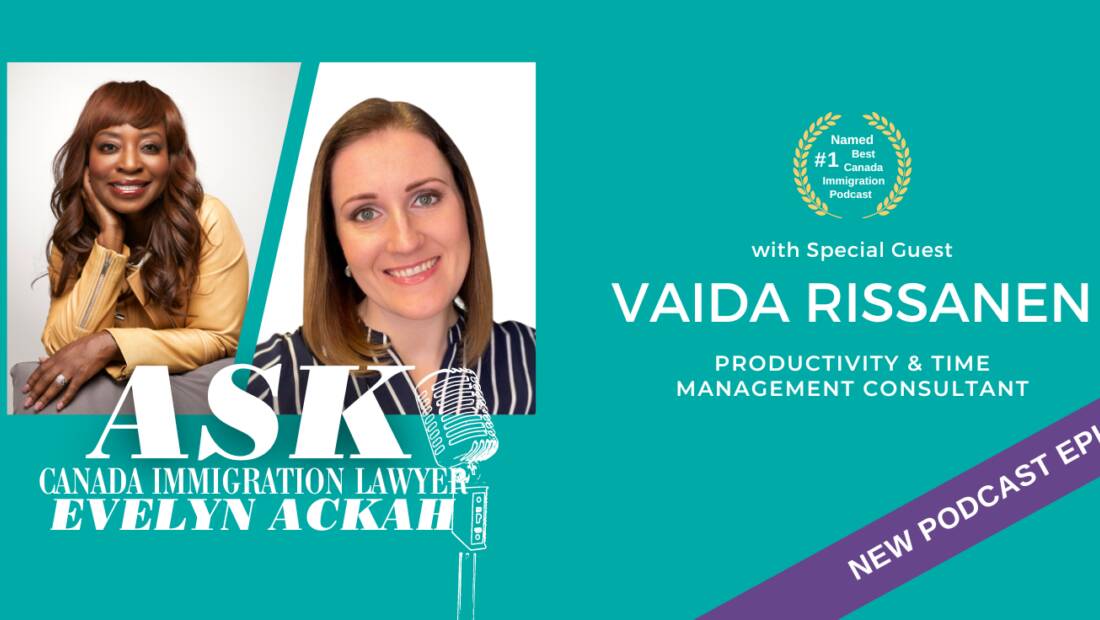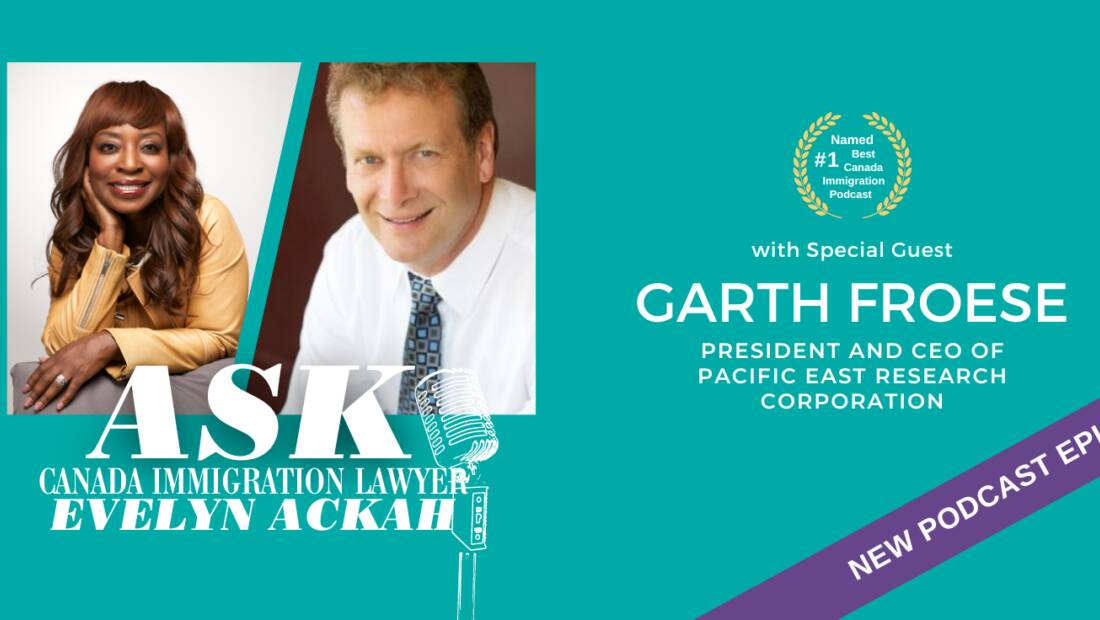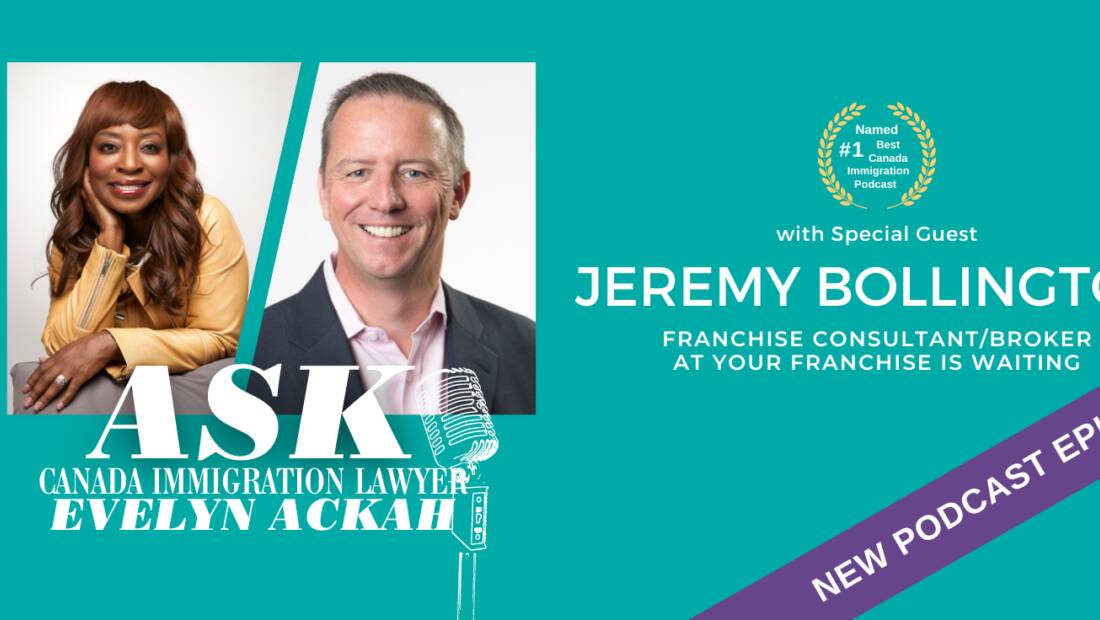Or listen on your favourite podcast app
BOOK YOUR FREE CASE EVALUATION
Calgary immigration lawyer Evelyn Ackah discusses some information, timelines and immigration processing issues for Canadian employers who are interested in strategies for hiring foreign workers because there is a labour shortage of Canadian workers. Evelyn covers topics including:
- how to expedite hiring foreign workers
- the Canadian government is looking to make the LMIA process faster
- current processing time is 2 weeks to 6 weeks to get an LMIA approved
- processing times for hiring a foreign worker from a Western European country, America, Mexico, a country that does not require visa and consular processing
- processing times for hiring a foreign worker through a consulate such as the Philippines, India or China
- hiring foreign workers under NAFTA (the Canadian-US-Mexico Free Trade Agreement), GATs and other employment treaties
- employment audit issues

About Evelyn Ackah
Evelyn Ackah is the Founder and Managing Lawyer at Ackah Business Immigration Law. We work with individuals and business owners from all over the world who want to cross borders seamlessly. For more information on immigration to Canada or the United States, Ask Evelyn Ackah at Ackah Business Immigration Law today at (403) 452‑9515 or email Evelyn directly at contact@ackahlaw.com.
The Ask Canada Immigration Lawyer Evelyn Ackah podcast by Calgary Immigration Lawyer Evelyn Ackah was named #1 Best Canada Immigration Podcast in 2022 by Feedspot.
BOOK YOUR FREE CASE EVALUATION
Transcript
Hello, my name is Evelyn Ackah. I'm the founder and managing lawyer of Ackah Business Immigration Law. Thank you so much for joining us on our first LinkedIn Live, which will also be cross-posted to the Ask Canada Immigration Lawyer Podcast. I wanted to do this LinkedIn Live because I'm getting so many calls from employers really struggling right now with hiring workers. Of course, the priority is always going to be hiring Canadian workers. But when they're struggling to find Canadian workers, they are now looking to consider hiring foreign workers.
I wanted to be able to have a discussion about what that process looks like now, what you can expect if you're an employer, and how you can get help from our law firm if you need it to help you with the process of bringing that foreign worker to Canada as quickly as possible. If you follow the news and the economic situation, you know that there are many, many businesses that are short-staffed, that are very much looking for skilled workers, as well as low-skilled workers. It is hard since COVID to find people who want to work. Nobody knows where they went, whether they opened all their own businesses or they retired, but things have definitely changed in the landscape for employers.
Looking outside of Canada is a realistic option. I want to talk to you about the ways you can bring foreign workers to Canada to help your business as quickly as possible. The first thing I'm going to focus on is going to be the labour market process, the Temporary Foreign Worker program. If you have any questions, those that are on the live, please put them in the chat. I'd be happy to read them and answer them as I move through this process today. If you are an employer that has used the LMIA Foreign Worker program, you know that historically it took a really long time. It's a big investment of funds, both legal and relocation and getting your foreign worker settled.
But you also need to look at the fact as, does it help your business grow? Does it help you stay in business? Does it help your hours continue to be as long as you'd like them to be when you can fill all the spots? Right now, the Canadian government is looking to make the LMIA process faster. We are seeing it anecdotally, LMIA's are being approved much faster, which is wonderful. I'm going to go through the process of the LMIA program so that you understand as an employer what is expected.
The first thing is you must continue to advertise for that one month at least, if not longer, on the Canada Job Bank, as well as three or four other places that target people that would be looking for your type of employee. Whether it's a professional or a low-skilled, you want to make sure you're addressing all the advertising requirements. Advertising for Job Bank is very different than advertising for your normal business. If you are in HR or legal, you can't just use the same process. You must ensure the ads meet the very specific criteria that the Job Bank has and the ESDC, Employment Services Skills Development Canada, have for you.
We can certainly help with that to make sure we've analyzed the ad, make sure it meets the criteria, and then you have to advertise for at least one month. We also recommend you keep the ads up longer. But when you meet that one month criteria, you can then submit the application, and you have to make sure it's as complete as possible. You cannot miss anything or it will come back. ESDC now has an LMIA portal where applications can be uploaded. Just like with other immigration processes, portals are becoming a reality for Service Canada. Thank goodness, we don't have to fax anymore.
I was just notified today on a conference I was attending that after I think it's April or May of next year, you will no longer even be able to email Service Canada your LMIA. Everything must be done through the portal. In the short term, we can still email. There's no faxing anymore. Thank goodness! And then you wait for processing. I can tell you from my experience, currently we are seeing a faster turnaround because the government is under pressure by employers to get foreign workers to Canada as quickly as possible. I'm seeing anywhere from two weeks to six weeks to get an LMIA approved.
And that is fabulous given that it used to be anywhere from three to four months before. They are prioritizing these applications. But then what happens after that? After that, if your employee is coming from a country where they need to be processed through a consulate, that is still taking longer. There is no doubt. If they're coming from the Philippines, if they're coming from India, China, those processes at the consulate could be anywhere from three to six months. This is not a short-term strategy. It is still going to take a while for you to get your person here on the ground working for you and benefiting your business.
If the person you're looking to hire is coming from a Western European country, America, Mexico, a country that does not require visa and consular processing, they can get here immediately after the LMIA is approved with a work permit application for the port of entry. If they need an ETA, an electronic travel authorization, they can get that as well. You really need to think based on your business needs where you want to recruit from.
Because if you can't wait six to eight months possibly, depending on which country they're coming from, you want to be very strategic about where you're looking to hire people from, Australia, New Zealand, Mexico, the United States, Western European countries, countries in Eastern Europe that don't require visas to come to Canada. Those are going to be your targets. You need to think about this. Another thing that just happened last week is the NOC code has changed again, and now it's under different criteria. It's called the Teer, and it's a new training employment category where the NOC codes have changed.
You need to be very certain before you post any position that you are using the most current job classification or your application will come back. Again, we can assist you to do the concurrence to make sure what the NOC used to be and what the new Teer is so that you are completing your application as properly and as completely as possible, because there is a new job classification that you must be aware of. Something else to think about when you're looking to hire foreign workers is that based on historical abuses, unfortunately, sometimes more of the low skilled jobs, nannies, et cetera, that were maybe having some challenges.
As an employer, you must have now an employment contract with your employee, your foreign worker, and you must also be able to share with them the government brochure that outlines what their rights and obligations and responsibilities of the employers are. They want to ensure, especially for low wage or low skilled positions, that you, as an employer, are sharing the information about what their rights and responsibilities are.
If you're audited under a compliance audit for your Temporary Foreign Worker file, you must be able to reflect that you've done that and maybe have the employee sign off that they've received that information, and that there is as well a signed employment agreement. We're hearing that for some employers who might be seasonal, et cetera, those are challenges to maybe get an employment agreement in place that meets the government's criteria. But you must make sure you do or you'll have struggles when it comes to your employment audit if you get audited. I just want to make sure that you are fully aware.
Right now, as I said, I'm hearing from people who want to hire chefs, they need people to manage restaurants, they need highly skilled workers, IT, engineer, there is a desperate need for us to grow our economy, as well as our workforce. And that is why the government of Canada has committed to increasing immigration. In the next two years, the numbers will increase to 500,000 or more immigrants they're looking to attract. Some of these people you may be able to bring in as foreign workers. And then once they're here, they can apply for permanent residents.
But when you do an LMIA, the idea is that employees will be able to work for you for one to three years. It depends on the job if you can get a longer term. We're asking for three years for all of our LMIAs currently so we can help the employer and it allows the employee, if everything works out, to be able to become a permanent resident before that work permit expires, and then you don't have to do this process again. Besides hiring foreign workers under the LMIA process, I want to talk about NAFTA, the new NAFTA, the Canadian-US-Mexico Free Trade Agreement, in terms of bringing people.
It's a wonderful tool if you're looking for a Mexican citizen or an American citizen to bring them to Canada. It can be under the NAFTA, I still call it NAFTA, the NAFTA professional category, the NAFTA intercompany transfer category. Those are great options to bring them in. If they don't have a title that's listed under the Professionals categories, you may want to consider in the short-term, could they provide consulting services to you in the short-term, and then you can do the LMIA process, which is something we do regularly, and then they move to being a full employee. But for the first two or three months, they could provide only consulting services, but it gets them to Canada sooner than later.
The NAFTA is a wonderful tool. We still use it. There are so many new treaties now, the Chile-Canada, Korea-Canada. There are a lot of treaties that you may want to consider, the General Agreement on Trade in Services for people coming from Europe, coming as consultants, professionals. There are a number of ways to get here that do not require using the LMIA process and that are much faster. I would always recommend you look to see, is there a treaty with this country that your perspective employee is a member of, and then that might be a faster way to bring them to Canada as well. We've talked about the LMIA process.
We've talked about NAFTA, GATS, treaties. As well, sometimes people can come in as business visitors doing after-sales service. If you have purchased a piece of equipment or a service, a consulting and you require these people to come to Canada, that might be another option under the after-sales service category so that they can enter Canada and actually do work in the short-term to install and train and get all the systems integrated and don't require work permit. In addition, Canada has a category for short-term work. It's 15 to 30 days for people coming to work and they can actually get their work permits as well at the airport assuming that they are visa exempt.
These are all options for you to consider as you're making your long-term plans for hiring foreign workers. Most employers cannot wait until people come as federal skilled workers. They need them here now. You need to look at what can you do to expedite that process? Could you do your ads now with the help of good lawyers, good advisors to meet the criteria for Job Bank and for LMIA just in case you can't find a Canadian, but your ads are already going to be compliant and then you can go straight to submitting your application. There are a number of strategies that we can help you with so that you can start planning and forecasting for your labour market needs into the new year starting now.
I hope this has been helpful to you because we keep hearing about the struggles to find great workers, and I want you to know there are ways to bring them here. Depending on which province you're in, there are different programs under PMP. There's lots of different ways, but they're very provincial specific. If you want to talk about that, we can certainly do a consultation and look at your options from the province you're in to see if you have other options as well to bring foreign workers to Canada.
Again, my name is Evelyn Ackah, and I'm with Ackah Business Immigration Law. I hope this little teaser has been informative and helpful.
If you'd like to discuss this more, you can always feel free to contact us at Ackah Business Immigration Law. We're at 403-452-9515. Feel free to contact us anytime. We'd love to help you cross the border seamlessly and bring your foreign workers to Canada to help your business continue to grow and thrive. Thank you so much and take good care. Bye, bye.

